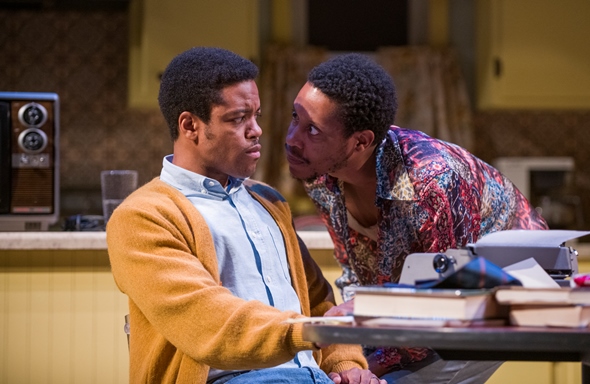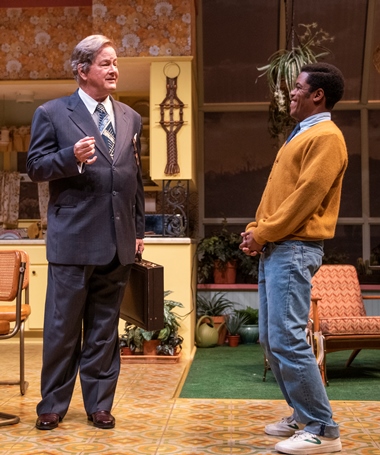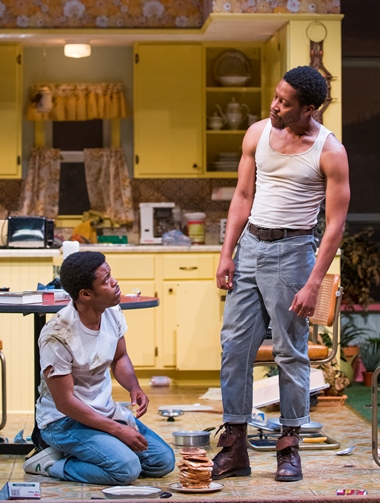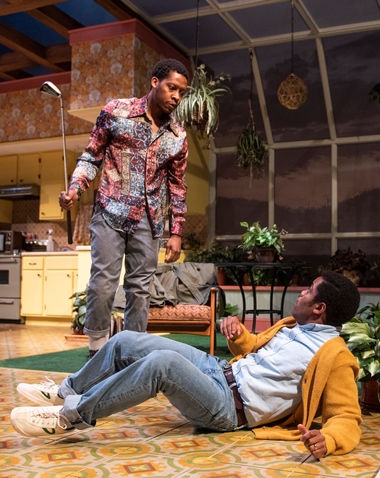‘True West’ at Steppenwolf: Warring brothers
go to the mat over fame, fortune and spelling

Screen-writer Austin (Jon Michael Hill, left) gets an ear (and eye) full from his brother Lee (Namir Smallwood) in “True West” at Steppenwolf. (Photos by Michael Brosilow)
“True West” by Sam Shepard, directed by Randall Arney at Steppenwolf Theatre through Aug. 25. ★★★★
By Lawrence B. Johnson
It’s a surreal encounter and also a never-ending story, Sam Shepard’s slugfest of a play “True West,” which sprawls across the stage in a lusty, mad and magnetic production at Steppenwolf Theatre.
The tattered remains of actors Jon Michael Hill and Namir Smallwood, who had just endured a mutual pummeling as contentious brothers unexpectedly and most unhappily reunited, shared in bravely earned applause at the show’s opening July 16. That erupting ovation was like the bell at the end of a 15-rounder. No need to ask for whom the bell tolled: It was for a two-man fraternity of the disillusioned, the disappointed, the finally and profoundly disenchanted.
“True West” holds a special place in the annals of Steppenwolf. Back in 1982, it was this show, with John Malkovich and Jeff Perry as the leads, that propelled Steppenwolf into national prominence when the fledgling company took it to New York.
Austin (played here by Hill) is an aspiring young playwright sprung from an Ivy League college, married with children. It’s late summer 1980, and Austin has left wife and family for the outskirts of Los Angeles to house-sit for his mother, who’s on vacation in Alaska. He’s lost in work on a screenplay that promises to be something big.
But when we first peer in on Austin, he already has a visitor, a somewhat older fellow of rough aspect and speech and, we’re about to discover, personal history. This is Austin’s brother Lee (played by Smallwood), whose life has taken quite a different path. Lee is a loner, a sort of desert rat who lives by petty theft – he breaks into people’s homes – and now stands before Austin swilling beer, like some wild creature that has strayed within the unfamiliar boundary of walls.
In no time, Lee is in Austin’s face, taunting him about his fancy life as an artist and the high-class school he attended and the big bucks he must be raking in. Austin just wants to be left alone. He’s facing a deadline. And what’s Lee doing here anyway? Perfect. A bone of contention. Lee snaps it up. He has just as much right as Austin to be in their mother’s house. And not only that, but Lee also has some ideas of his own for stories – true stories about real people. Great, replies Austin: Why don’t you write them? Ah, if only you could spell.

Francis Guinan plays the movie producer who sees a bright future for young screen-writer Austin (Jon Michael Hill).
To this point, the two pugilists are clearly defined by type: Hill’s sober, serious and dedicated Austin is the model character in the white trunks; Smallwood’s already unnerving Lee is the troubled ne’er-do-well in black trunks. That’s about to get really muddied.
The turn comes when Austin’s Hollywood producer (the delightfully airy Francis Guinan) pops in to see how Austin’s outline is coming, meets Lee and – what? – agrees to a golf outing with this ragamuffin the next morning. Long story short, the producer agrees with Lee that a story idea he proposes has real potential. What the inexperienced Lee needs, of course, is a skilled screenwriter to bring it all to life. That would be, let’s see…
Now we get down to the hard core of brotherly competition, mutual resentment and a bloody war that probably dates back to when these two guys were just learning to walk – and punch. Two stories are now on the table: Austin’s, a love story, and Lee’s, a tale of jealousy that sends two angry men on a chase by pick-up truck and horseback across the panhandle of Texas.

Housekeeping turns out not to be the strong suit of brothers Austin (Jon Michael Hill, left) and Lee (Namir Smallwood).
Smallwood’s edgy, smoldering, dangerous Lee imagines himself the realist, a man of the raw and defiant world who, almost on a whim, can shift gears and outdo Austin at his own game. The key trick of Hill’s performance is Austin’s complete and believable disintegration before our eyes. Maybe Lee isn’t the only one who can slip silently into an unguarded home and slip out with some treasure, some sign of a novice thief’s worthy place in the world of the unprivileged.
But it isn’t all that easy. Accusations get tossed around, taunts, challenges. Tempers flare into conflagrations. Push comes to shove. Mom’s house gets rearranged a bit.
And then she walks in: the mildly curious, indeed almost oblivious Jacqueline Williams as a mother who has some familiarity with the, well, rivalry between her sons. Observing what anyone else might construe as a gladiatorial throwdown, she tells the boys that if they’re going to fight, they really should go outside.
Are they seriously trying to kill each other? Hard to say. After all, in its bleak and perverse fashion, “True West” is a comedy – even if no one gets the last laugh.
Related Link:
Performance location, dates and times: Details at TheatreInChicago.com


